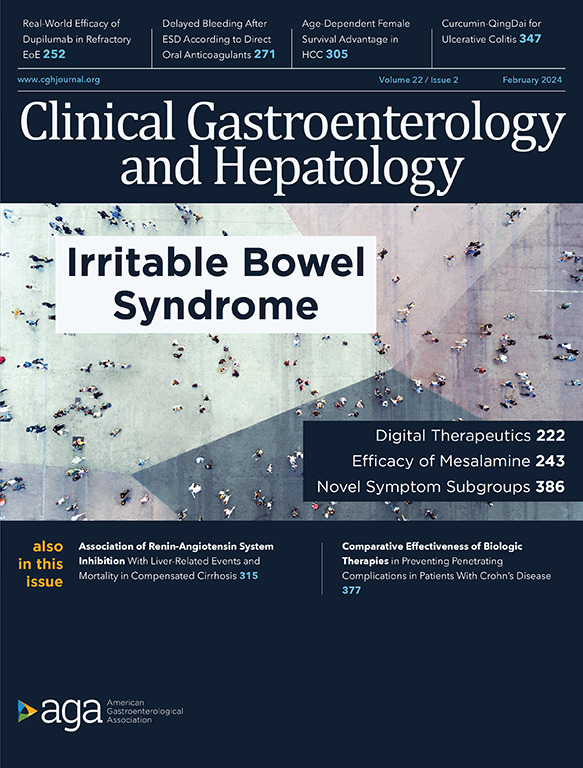High Diagnostic Value of Transient Elastography for Advanced Fibrosis and Cirrhosis in Patients With Chronic Hepatitis Delta
IF 11.6
1区 医学
Q1 GASTROENTEROLOGY & HEPATOLOGY
引用次数: 0
Abstract
Background & Aims
Liver biopsy remains the gold standard for fibrosis staging in patients with chronic hepatitis delta (CHD). Here, we comparatively evaluated the performance of transient elastography (TE) and biomarkers for the diagnosis of liver fibrosis in patients with CHD.
Methods
A total of 230 HDV-infected RNA-positive patients from various centers who underwent liver biopsy and liver stiffness measurements (LSMs) using Fibroscan, within a period of 6 months maximum, were investigated retrospectively. Area under the receiver operating characteristic curve and Youden index were used to establish cutoff values of LSM. TE was compared with other noninvasive tests: aspartate aminotransferase to platelet ratio index, Fibrosis-4, and Delta-4 fibrosis scores.
Results
Histologic fibrosis stage distribution was: 20.4% for F0-F1; 27.0% for F2; 18.7% for F3; and 33.9% for F4. TE demonstrated good diagnostic performance for detecting cirrhosis and advanced fibrosis with an Area under the receiver operating characteristic curve of 0.88 and 0.86, which were significantly higher than those obtained with the other noninvasive tests (P = .004 and P < .001). With a cutoff value of >12 kPa for cirrhosis, the sensitivity was 70.5%, specificity was 86.2%, positive predictive value was 72.4%, negative predictive value was 85.1%, and accuracy was 80.9%. Using 10.4 kPa as the cutoff value for F3, the sensitivity was 70.2%, specificity was 83.5%, positive predictive value was 82.5%, negative predictive value was 71.7%, and accuracy was 76.5%. In 89% of patients with LSM ≤6.2 kPa, liver biopsy disclosed only absent or minimal fibrosis.
Conclusion
TE demonstrated good diagnostic performance for advanced fibrosis and cirrhosis in patients with CHD. Advanced fibrosis is highly probable for LSM values ≥10 kPa. LSM values <6 kPa almost totally exclude significant fibrosis. Between 6 and 10 kPa, liver biopsy should be discussed.
瞬态弹性成像对慢性乙型肝炎患者的晚期纤维化和肝硬化具有很高的诊断价值。
背景和目的:肝活检仍是慢性乙型肝炎(CHD)患者肝纤维化分期的金标准。方法:我们对来自不同中心的 230 名 HDV 感染 RNA 阳性患者进行了回顾性调查,这些患者在最长 6 个月的时间内接受了肝活检并使用 Fibroscan® 进行了肝脏硬度测量(LSM)。AUROC和Youden指数被用来确定LSM的临界值。将 TE 与其他无创检测(NIT)进行了比较:结果:结果:组织学纤维化分期分布为:F0-F1为20.4%;F2为27.0%;F3为18.7%;F4为33.9%。TE在检测肝硬化和晚期纤维化方面表现出良好的诊断性能,AUROC分别为0.88和0.86,明显高于其他NITs(P = .004和P < .001)。肝硬化的临界值大于 12 kPa 时,灵敏度为 70.5%,特异性为 86.2%,阳性预测值 (PPV) 为 72.4%,阴性预测值 (NPV) 为 85.1%,准确率为 80.9%。以 10.4 kPa 作为 F3 临界值,敏感性为 70.2%,特异性为 83.5%,PPV 为 82.5%,NPV 为 71.7%,准确性为 76.5%。在LSM≤6.2 kPa的89%患者中,肝活检仅发现无纤维化或轻微纤维化:TE对CHD患者的晚期纤维化和肝硬化具有良好的诊断性能。LSM 值≥10 kPa 时,晚期纤维化的可能性很高。LSM 值<6 kPa 几乎完全排除了明显纤维化的可能性。在 6 至 10 千帕之间,应讨论肝活检。
本文章由计算机程序翻译,如有差异,请以英文原文为准。
求助全文
约1分钟内获得全文
求助全文
来源期刊
CiteScore
16.90
自引率
4.80%
发文量
903
审稿时长
22 days
期刊介绍:
Clinical Gastroenterology and Hepatology (CGH) is dedicated to offering readers a comprehensive exploration of themes in clinical gastroenterology and hepatology. Encompassing diagnostic, endoscopic, interventional, and therapeutic advances, the journal covers areas such as cancer, inflammatory diseases, functional gastrointestinal disorders, nutrition, absorption, and secretion.
As a peer-reviewed publication, CGH features original articles and scholarly reviews, ensuring immediate relevance to the practice of gastroenterology and hepatology. Beyond peer-reviewed content, the journal includes invited key reviews and articles on endoscopy/practice-based technology, health-care policy, and practice management. Multimedia elements, including images, video abstracts, and podcasts, enhance the reader's experience. CGH remains actively engaged with its audience through updates and commentary shared via platforms such as Facebook and Twitter.

 求助内容:
求助内容: 应助结果提醒方式:
应助结果提醒方式:


